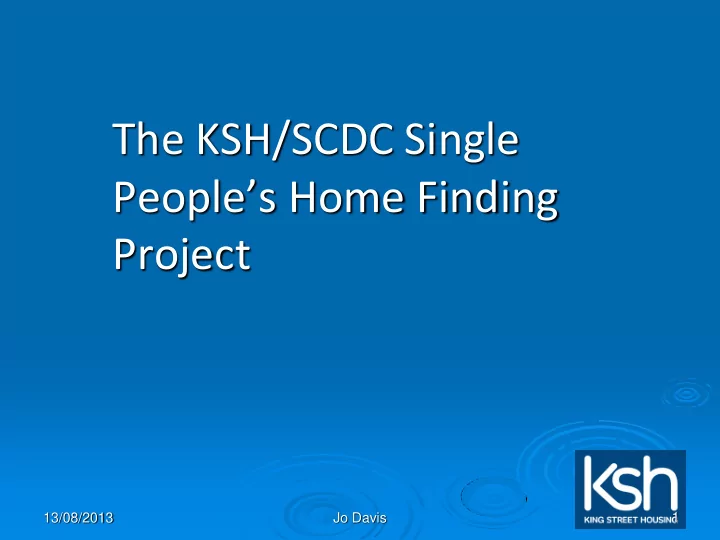

The KSH/SCDC Single People’s Home Finding Project 1 13/08/2013 Jo Davis
(Previously) funded by….. Now funded solely by 2 13/08/2013 Jo Davis
KSH/SCDC Single People’s Home Finding Project - origins Funded by SCDC and Crisis for 12 months initially from April 2012 Funded by SCDC from April 2013 Managed by King Street Housing Society Aim: to help single non-priority homeless households access sustainable accommodation in the Private Rented Sector 3
Challenges facing the Single People’s Home Finding Project LHA restricted to Shared Accommodation Rate (SAR) for single people under 35 years old from January 2012 SAR = 64% of 1 bedroom rate = £332.15pcm (April 2013) 1 bedroom rate (over 35s only) = £520pcm Shortage of shared accommodation especially in SCDC area Single room in a shared house in Cambridge typically costs from £475pcm upwards 4
Challenges facing the Single People’s Home Finding Project • Letting Agency Admin fees typically £200 • Many shared houses specify ‘Working only’, ‘Professional only’ • Lots of competition for places • Landlord concerns about young people • Lack of professionalism/understanding among some private landlords • Navigating the Housing Benefit system – inconsistencies between councils 5
KSH/SCDC Single People’s Home Finding Project – how it works • Single person approaches SCDC for help finding accommodation • Non-priority referred to Homefinder • In-depth interview to assess needs, risks, vulnerability, budget etc. • References taken • Options discussed…… 6
Tenancy Sustainment • 1 month, 3 month and 6 month tenancy health checks • Resolving problems between tenants and landlords • Arranging alternative accommodation where placement turns out to be unsuitable 7
Lodgings Statistics • The Scheme has made 13 Lodging placements • 11 male/ 2 female Lodger • The average age of a Lodger placement is 26 • Lodgers’ income : 5 full time employed, 2 part -time employed, 6 unemployed • Only 3 placements have been into SCDC stock (all 3 landlords work full time i.e. not affected by Bedroom Tax) However interest is now starting to be shown. 8
Advantages • Affordable accommodation • Benefits the Landlord from additional income • Companionship • A good initiation for the younger lodger for independent living. • No Admin Fees 9 •
• Aids with the bed room tax • Less discrimination from landlords against young people, non-working etc. • Basic accommodation and reduced responsibility for lodgers 10
Stakeholder feedback …..Joanne and her team Thank you so much for all provide this with an element of utmost professionalism and your help and everything respect for both the client and you have done for me. the prospective landlord - of You’re a star and I am very which I am one. As a result, grateful. Please always King Street clients manage to pop in for a cuppa secure housing which is a first whenever you pass. step towards them getting back on their feet and looking Louise Meadowcroft for employment….. (July 2013) Dr. Sudesh Sangray (2013) 11
The Challenges of Lodgings Placements • Finding placements that will accept LHA • Negotiating with the Benefits Department • Marrying up potential placements and lodgers • Encouraging the use of official lodgings agreements • Agreeing the boundaries and house rules and them being adhered to 12
The Challenges of Lodgings Placements • Placement sustainment – lack of floating support • Safeguarding SCDC Deposits • Encouraging Social housing tenants to take in lodgers due to fear of a loss of income or threat of eviction (fear that letting a room out could mean them being in breach of their tenancy) 13
Liability It is important to clearly state that you are acting as a coordinator not as an agent in the placements process. Your Organisation should produce its own lodgings agreement which should clearly state that neither you as the coordinator or the organisation you are representing are liable in regards to the placement. You are merely offering support and guidance through the process. 14
Developing the lodging scheme • Advertising to landlords • Standard landlord and tenant profiles • Web-based register – via HomeLink? • Information to social tenants – rights, impact on benefits etc. • Closer working with council housing management staff • Supporting landlords and tenants 15
Top Tips Always complete a thorough assessment , covering risks and needs. Produce your own Lodgings Agreement Always visit the property Work with the LA’s to have the LHA paid directly to the landlord - this acts as an incentive. 16
Create personal profiles Make it clear that neither you or the organisation you are representing are liable or responsible for the placement Have a strategy in case of a placement break down Provide basic aftercare in regards to a ‘light’ floating support service 17
Thank You Contact Details Joanne.davis@kingstreeths.org.uk 07867 397721 01223 312294 18
Recommend
More recommend